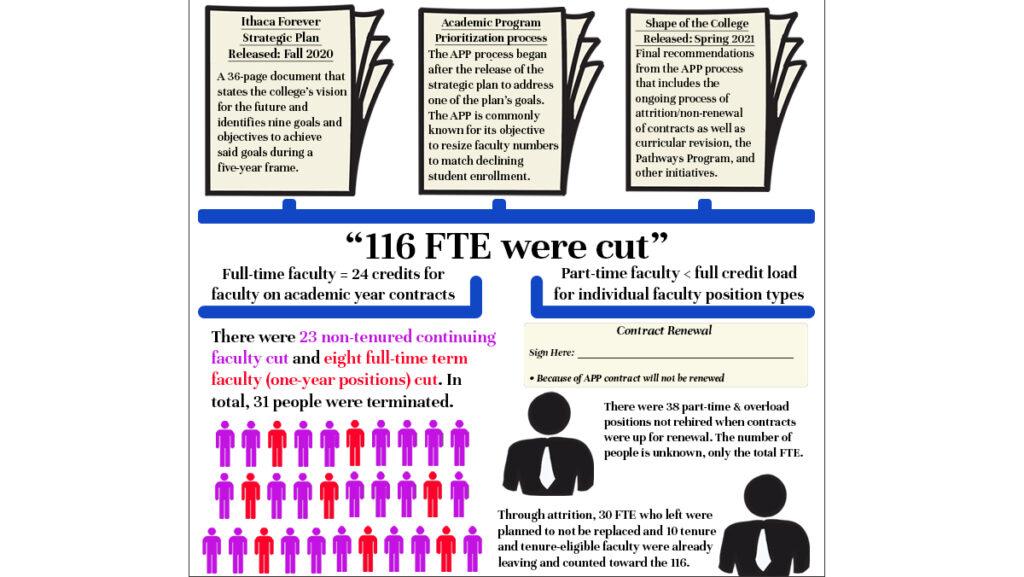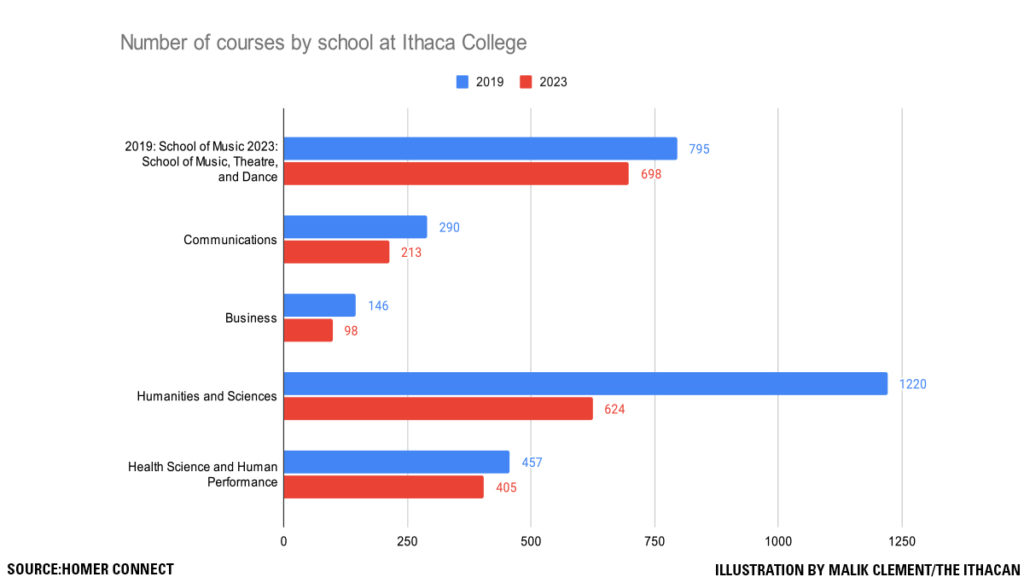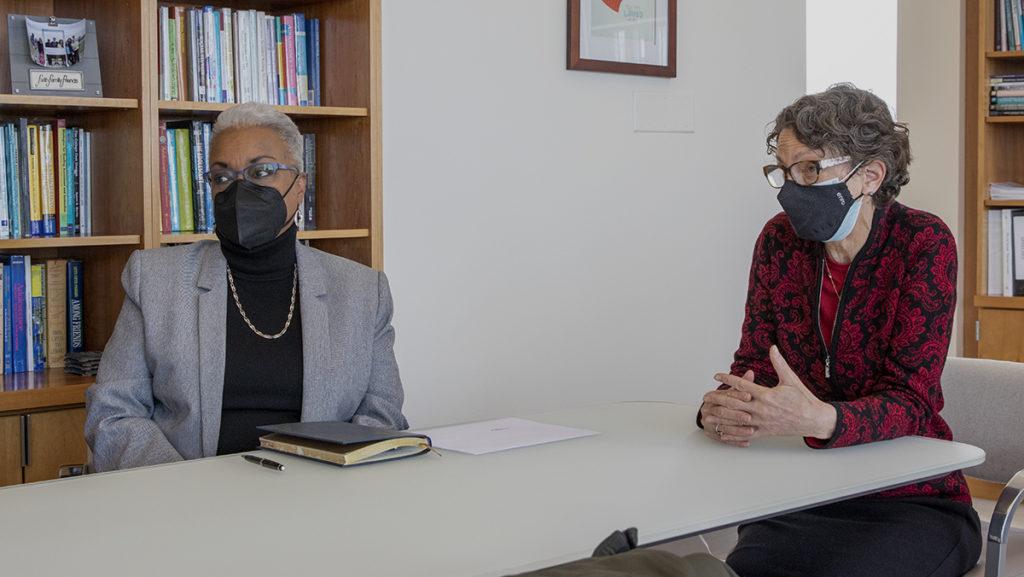The Ithaca College Academic Program Prioritization Implementation Committee (APPIC) released a draft of the “Shape of the College” document, which includes recommendations for the elimination of 116 full-time equivalent (FTE) faculty positions; 26 department, major and program discontinuations; and other program changes they say will improve academics at the college.
The majority of FTE reductions will take place in the School of Humanities and Sciences, with 20 departments having to make 41 FTE faculty cuts. In the School of Business, four departments will have to make seven FTE faculty cuts. The Roy H. Park School of Communications and the School of Health Sciences and Human Performance (HSHP) each have three departments making cuts, with 17 FTE faculty eliminations in the Park School and 11 FTE faculty eliminations in HSHP. Two departments will eliminate seven FTE positions in the School of Music. Additionally, the APPIC recommends three non-school–specific reductions, six release time positions and 24 attrition positions.
The “Shape of the College” document recommends which programs and departments should be discontinued, reorganized, consolidated or grown as part of the Academic Program Prioritization process. The APPIC shared a draft with students, faculty and staff Jan. 13. Deans, faculty and program directors will review the document and provide feedback throughout January, and the Student Governance Council will host a Zoom meeting for students with the APPIC at noon Jan. 19. A completed document will be presented to President Shirley M. Collado and La Jerne Cornish, provost and senior vice president for academic affairs, in early February. Decisions will be made about programs at the end of February.
Program and Faculty Reductions
In October 2020, Cornish announced that approximately 130 FTE faculty positions were going to be eliminated at the college, that tenured faculty were at risk and that entire departments and programs could be eliminated. Cornish has said this decision aligns with the strategic plan Ithaca Forever, which had to be accelerated because of the COVID-19 pandemic’s effects on the college’s finances. The impending cuts have been met with resistance and concern from faculty, staff, students, alumni and Ithaca community members throughout the fall semester.
In a Jan. 13 email to the campus community, the APPIC stated that it recommends retention of all tenured and tenure eligible faculty. The draft document recommends the reduction of 116 FTE faculty positions rather than 131. The document states that most of these decreases will occur within the next two years.
In the 2020–21 fiscal year, as of Dec. 16, there are 34 FTEs in the School of Business, 264 in H&S, 98 in HSHP, 73 in the School of Music and 71 in the Park School. After the cuts are completed, there will be 27 FTEs in the School of Business, 222 in H&S, 87 in HSHP, 66 in the School of Music and 53 in the Park School.
If these changes are made, the Park School will have the largest percent decrease from 2020–21 fiscal year, as of Dec. 16, with approximately a 25% decrease in FTE positions. The School of Business will have approximately a 21% decrease, H&S will have approximately a 16% decrease, HSHP will have approximately an 11% decrease and the School of Music will have approximately a 10% decrease.
Significant cuts were also made from the 2019–20 fiscal year to the 2020–21 fiscal year, as of Dec. 16. In the 2019–20 fiscal year, the School of Business had 40 FTE faculty positions, H&S had 297, HSHP had 102, the School of Music had 87 and the Park School had 80. If these changes are made over the next two years, this means that compared to the 2019–20 fiscal year, the Park School will have approximately a 34% decrease, the School of Business will have approximately a 33% decrease, H&S will have approximately a 25% decrease, the School of Music will have approximately a 24% decrease and HSHP will have approximately a 15% decrease.
The document states that reductions will occur in the Departments of Accounting and Business Law; Anthropology; Art History; Biology; Chemistry; Communication Studies; Computer Science; Economics; Education; English; Environmental Studies and Sciences; Exercise Science and Athletic Training; Finance and International Business; Gerontology; Health Promotion and Physical Education; Journalism; Management; Marketing; Mathematics; Media Arts, Sciences and Studies; Modern Languages and Literatures; Music Theory, History and Compositions; Music Performance; Philosophy and Religion; Politics; Psychology; Recreation and Leisure Studies; Sociology; Strategic Communication; Theatre Arts; the Women’s and Gender Studies program; and the Department of Writing.
The APPIC has not included the number of reductions from each department to preserve anonymity of those losing their jobs. The document states that in some of the departments and programs listed, one or fewer FTE positions will be reduced. The APPIC also wanted to leave open the possibility for departmental review, a process that could change the number of reductions, the document states.
The document states that these reductions are a combination of overloads, part-time faculty and full-time faculty. It may also include retirements and phased retirements. The reductions listed in the non-school–specific category include overload and part-time positions in the Ithaca College Integrated Curriculum (ICIC) Program, Ithaca College Seminar, the Honors Program and the New York City program.
The attrition reductions are incremental reductions needed to reach selected FTE numbers. These reductions result from voluntary attrition, so they may take up to three years to occur, the document states.
“No recommendations were easy, as we recognize the cost of some of these outcomes to individuals will be high,” the APPIC states in the document. “Those colleagues whose positions were discontinued have given much to this community, and we are grateful for those contributions.”
Program Discontinuations
The undergraduate programs, departments and majors that the APPIC recommends for discontinuation include the ICIC program. In HSHP, the APPIC recommends the discontinuation of the Department of Recreation and Leisure Studies, which includes the Therapeutic Recreation major and the Outdoor Adventure Leadership major. In H&S, the APPIC recommends that the Department of Communication Studies, including the Communication Studies major, and the Department of Gerontology, which includes the Aging Studies major, be discontinued. The Gerontology Institute, which promotes aging-related research, curriculum and activities and is the academic home of the Longview Partnership, will be restructured as a result of this proposed change.
The APPIC also recommends the elimination of 10 undergraduate teacher education majors housed in H&S and the three undergraduate teaching majors in HSHP.
The graduate programs that the APPIC recommends for discontinuation are the Masters of Music in Performance, Conduction, Composition, Suzuki Pedagogy and String Performance as well as the Master of Fine Arts in Image Text in the Park School.
The APPIC recommends that the tenured faculty and the tenure–eligible faculty in these programs be relocated to other departments or programs at the college. It also recommends that faculty contracts be managed to support students enrolled in these majors and programs until they graduate.
Other Recommendations
The APPIC also recommends the college to simplify its undergraduate application process. The document states that the highly structured curricula at the college and defined hours of coursework needed to graduate may discourage applicants and that a new admissions approach should be implemented.
In the document, the APPIC also recommends increased flexibility of curriculum. The document states that the specificity of majors and minors and the requirements to fulfill them can be confusing and limiting for students. The APPIC recommends faculty to review school and department requirements, examine prerequisites and consider opportunities for collaboration and interdisciplinarity with other schools. This can include decreasing the number of credits required for majors and minors, reducing the numbers of concentrations offered within majors and reducing the numbers of majors offered within a department.














